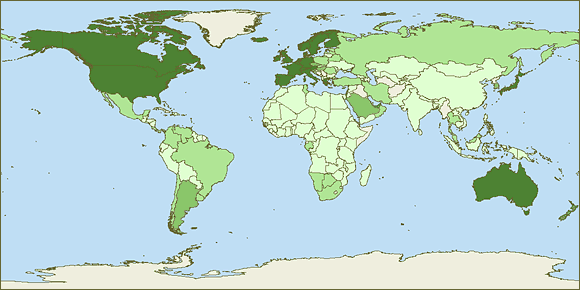Quote:
Originally Posted by redpoint5

So, we need to remove the particulate traps and catalytic converters from our diesels and let the coal roll  |
Blow up a few more Pinatubos. Krakatoas. Burn coal as dirtily as possible. Lob a few hundred megatons of nuclear ordnance up in the air and dance in the radioactive snow.

Quote:
Originally Posted by redpoint5

Nice post niky. My other question is whether global warming, at least at its current form, might have more positive than negative consequences for humans. It's a topic almost not discussed at all.
1 site I mentioned above said we would observe net positive effects until 2080. Nobody commented on it.
https://www.spectator.co.uk/2013/10/carry-on-warming/
If we reap positive benefits until 2080, and then gradually begin to experience negative consequences, the rational thing to do would be to leverage science/technology to keep conditions somewhere around 2080 levels to maximize human well being. I expect we'll have much better technology in the next 60 years. |
Remarkably rosy picture.
The thing is... has anyone compared the net positives to the net negatives?
That 200,000 starving due to ethanol production... is it ethanol production that is causing starvation? Or is it the fact that farmgate prices are so low in some places that farmers themselves would starve if they grew food crops instead of fuel crops (there's a lot to be read into Indian farmer suicides and studies on farmer starvation in previous decades... before biofuels came in). And, note, the science on biofuels has always been iffy... a lot of "mainstream" scientific opinion is divided on them. Politicians like them precisely because it helps enrich local farmers while reducing foreign oil dependence, giving them political capital. Greenwashing is just a bonus.
As for the cost of electricity related to deaths, that's a more difficult topic to tackle. And should be compared to the respiratory deaths (hundreds? thousands? hundreds of thousands?) caused by fossil fuel burning. Both numbers being imaginary and derived from statistical modelling.
Which reminds me of a passage in Larry Niven's "Rainbow Mars"... where, after decades of Svetz the Time Traveller stories, Niven bookends it with a story in which the Ministry of Space takes over the Ministry of Time Travel, and grimly reminds them that every time they travel through time, the massive amount of energy used kills off hundreds, if not thousands of people. A blackout here leading to an ICU unit failing, or food spoiling in stockage, or any of a number of things.
When we start counting the costs of everything, we should be counting the cost of *everything*. Every choice we make contributes in one way or another to the possible life or death of another human. Every purchased iPad or fruit slushie contributes either to the starvation of some African villager, the uplift of some Chinese factory worker, or the poisoning of his or her thrice removed cousin from poisoning due to pollution from a nearby mine.
We could, likely, feed, clothe, medicate and heat/cool everyone properly with very much less than we use now. Whether we use fossil fuel or "renewables." But we spend literally trillions of dollars on useless frivolities, instead. What percentage of energy or food scarcity deaths do we attribute to those numbers?
-
Also, it is very optimistic to claim there will be net benefits. There's a reason colder countries are more prosperous, on average:
Fat Knowledge: The Key to Increasing GDP? Move Away From the Equator

(that one is old, note the Chinese industrial revolution hasn't taken yet... delayed for decades, as it was, by the cultural revolution and the enormous set-back in terms of education and science it caused)
https://www.theguardian.com/environm...climate-change
(hell, I've never read this study or link before I looked it up, but it's a common observation out here... the richer and more prosperous Asian nations are typically colder ones like China, Japan and Korea. NoKor is a special situation... a political tangle of Chinese and Western interests creating a hermit kingdom.)
Then you get the black swan events... and droughts and famines in equatorial and near-equatorial countries... how many more economic refugees can the world absorb? How many more Syrias?
Could there be benefits? Yes, maybe. To the coldest countries. But there's a reason cold countries are typically richer than the rest of us. And it has everything to do with not being so hot you're sweating buckets while sitting inside an air-conditioned office trying desperately to be productive instead of dying of dehydration.